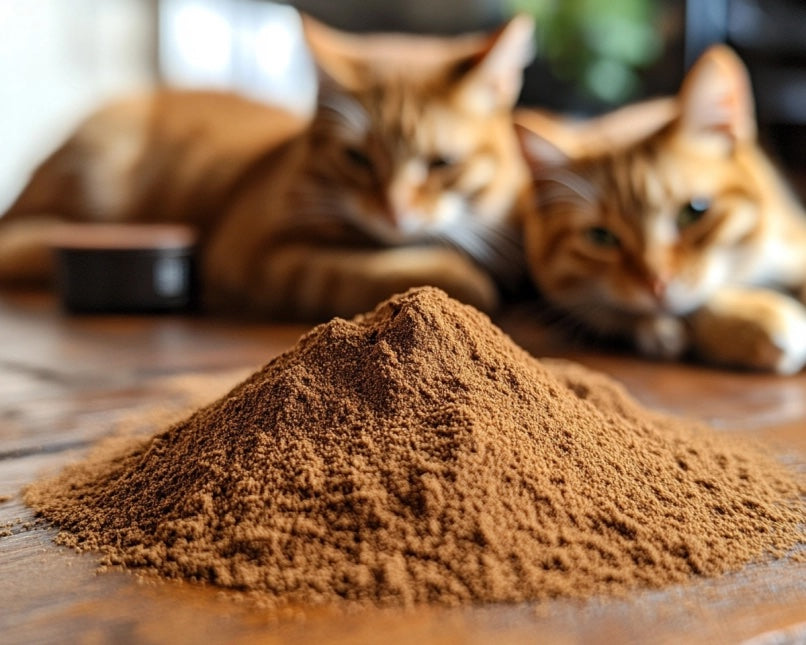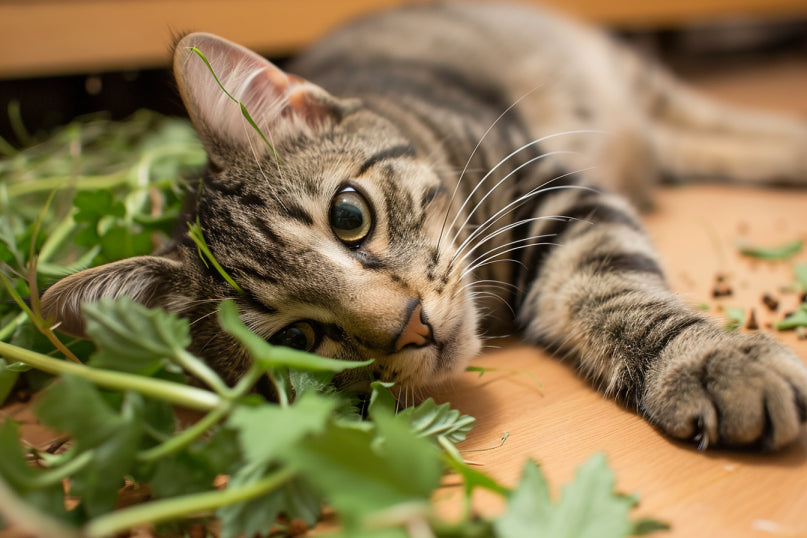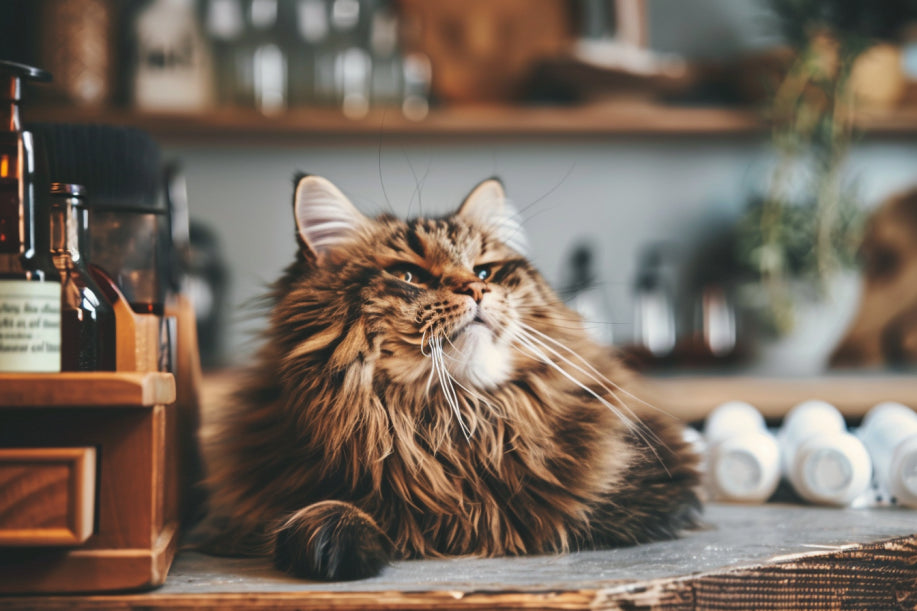
Cats are true carnivores, meaning they need to eat meat to survive.
Not only do they not need carbs, they’re "sweet blind". Cats don’t have sweet taste receptors because of a Tas1r gene mutation.
Though cat owners know they might nosh on watermelon slices, coconut flakes, or pineapple chunks. Which fruits are safe for your cat? We sat down with Dr.Shadi Ireifej, the Chief of Medicine at VetTriage, to find out.
Apples, Apricots, and Peaches

Apples, apricots, and peaches are good treats for overweight or older cats who have slower metabolisms. Because they’re more than 85 percent water and high in fiber, they can help to push food and fur through your kitty’s digestive tract. Just make sure to remove their leaves, seeds, pits, stems, and skins. They contain a fast-acting poison called cyanide. It can cause dilated pupils, difficulty breathing, bright red gums, shock, or death.
Bananas
Bananas have 27g of carbs and 17g of sugar. Yet they’re bursting with vitamin B6 and potassium that support your cat’s heart and kidneys. Bananas also have a mineral called manganese. It encourages your cat’s body to create collagen. That’s important for senior and geriatric cats because they may have thin, dry, or loose skin. Treat your kitty to a one-inch chunk. But pull off the peel first, as it contains salicylic acid. Found in aspirin, it can lead to bone marrow suppression, liver inflammation, stomach ulcers, and kidney damage.
Cherries

Cherries can protect your kitty’s heart against damage and inflammation. Because they boost melatonin levels, they can also help brachycephalic cats (e.g. Persians, Himalayans, or Burmese) sleep better. Cherries are only safe for your cat if you remove their leaves, stems, roots, and pits.They’re loaded with amygdalin, a chemical compound that breaks down into cyanide. Cherry poisoning is rare in cats. Wilted leaves and pits have to be chewed before they're swallowed for toxins to be released.
Citrus (oranges, tangerines, clementines, grapefruit, lemons, and limes)
Citrus fruits aren’t safe for your cat. They contain psoralens that can make your cat sensitive to the sun. Their leaves, peel, seeds, and stems are also full of citric acid. It can cause depression, weakness, trembling, drooling, and skin rashes. Citrus fruits are packed with essential oils (i.e., limonene and linalool). They can irritate your cat’s respiratory tract. Their edible fruits have the lowest amount of essential oils. Eating a bite their flesh will most likely cause your cat to have vomiting or diarrhea.
Coconuts

Coconuts won’t harm your cat. Coconut oil could strengthen your cat’s immune system and help with hairballs. It may reduce inflammatory arthritis, improve bad breath, and help with a healthy stomach. Because coconut oil has 50 percent more saturated fat than butter, it may cause pancreatitis and hepatic lipidosis, or fatty liver disease. Coconut milk is made by soaking shredded coconut meat in water and straining it. It’s hard for cats to digest. Coconut water is the liquid found inside unripe coconuts. It’s filled with potassium, the mineral and electrolyte that controls your cat’s heartbeat and breathing. Coconut water can lead to hyperkalemia. That’s a buildup of potassium that acidifies your cat's blood and causes abnormal heart rhythms.
Grapes and Raisins

Grapes and raisins are toxic to cats. They contain mycotoxin and salicylate that may cause sudden kidney failure.Raisins that are added to granola bars or cookies can also be choking hazards. If your cat eats grapes or raisins by accident, she might vomit within 12 to 24 hours. If not, your veterinarian can make her throw up. Then give her activated charcoal to mop up the remaining toxins in her GI tract.
Melons (cantaloupes, honeydews, andwatermelon)
Melons are 90 percent water and have eight grams of sugar. They’re also rich in vitamins, antioxidants, and amino acids.“I recommend cantaloupe and watermelon for all cats to prevent kidney disease and failure as they get older,” Dr. Ireifej says. “One of the most common and serious problems for cats with kidney disease is dehydration.” Remove melon seeds because they’re chock-full of amygdalin. It can be converted into cyanide by the bacteria in your cat’s GI tract. Melon rinds are also difficult to digest and can be covered in mold, pesticides, and chemicals. They’re choking hazards and intestinal blockers.
Pears

Low in calories, high in water, and loaded with fiber, pears are a great snack for cats when served in moderation. They’re crammed with copper and vitamins C and K that crank up your cat’s immune system. Pears with red skins contain flavonoids that may improve your cat's heart health and strengthen her blood vessels. Green pears feature carotenoids that keep your cat’s vision sharp. As with apples and cherries, pear seeds contain cyanide and need to be carefully removed.
Berries (Blueberries, blackberries, raspberries, and strawberries)

Berries are safe summertime treats for cats. They’re more than 84 percent water and have less than 15g of sugar per cup. They can boost brain function and prevent age-related memory loss. Berries also encourage saliva production, which stops bad bacteria from sticking to your cat’s teeth. But blackberries, blueberries, and raspberries should be given in moderation. They contain a natural sweetener called xylitol. According to the Journal of Veterinary Pharmacology and Therapeutics, xylitol won't lower your cat’s blood sugar. But it might cause liver disease.
Pineapples

Pineapples are packed with copper, fiber, folate, and B6. They also contain an enzyme called bromelain. It reduces inflammation, swelling, bruising, and pain. Pineapples can help create red blood cells and dissolve blood clots.While their leaves are non-toxic to cats, their spikey skins and hard cores can be choking hazards. Don’t feed your cat pineapple juice or canned pineapples. They have twice as much sugar as fresh pineapples and can cause diarrhea or vomiting.
Poison Control
If you're worried your cat has been poisoned, get in touch with your regular vet from 8 a.m. to 5 p.m.
Onevenings, weekends, or federal holidays:
- Video chat with a licensed veterinarian at VetTriage. Sessions cost $50 regardless of duration.
- Call the ASPCA Animal Poison Control Center at 888-426-4435. There's a $75 consultation fee. It includes follow-up calls with your vet.
Follow Munchiecat on Instagram, Kickstarter, and Facebook.


